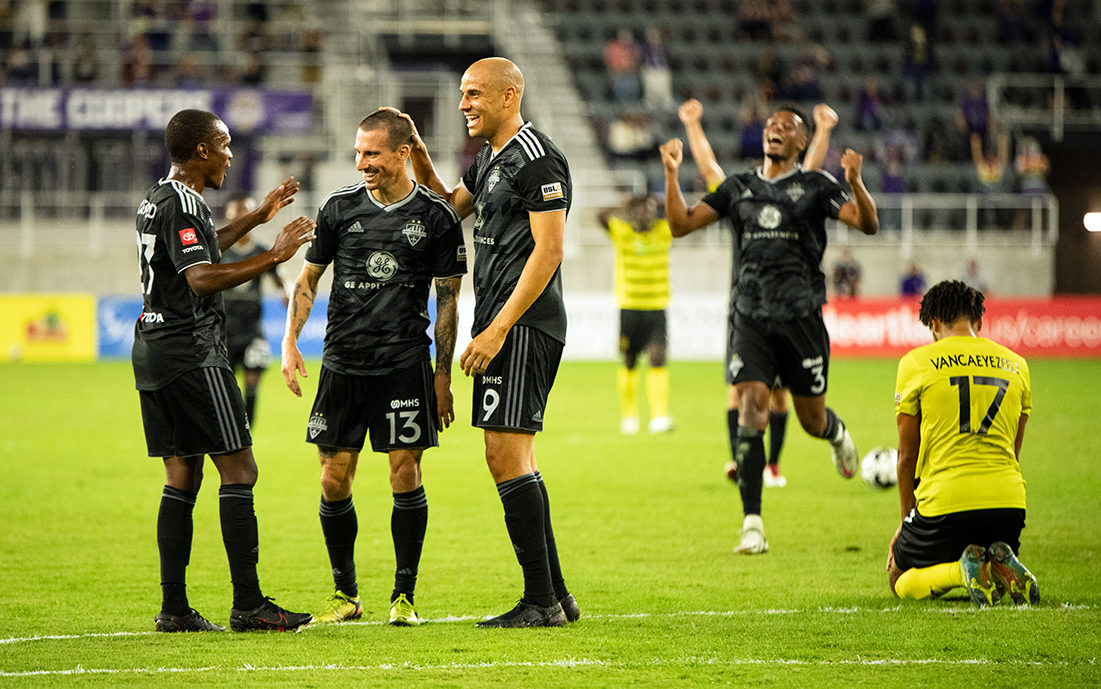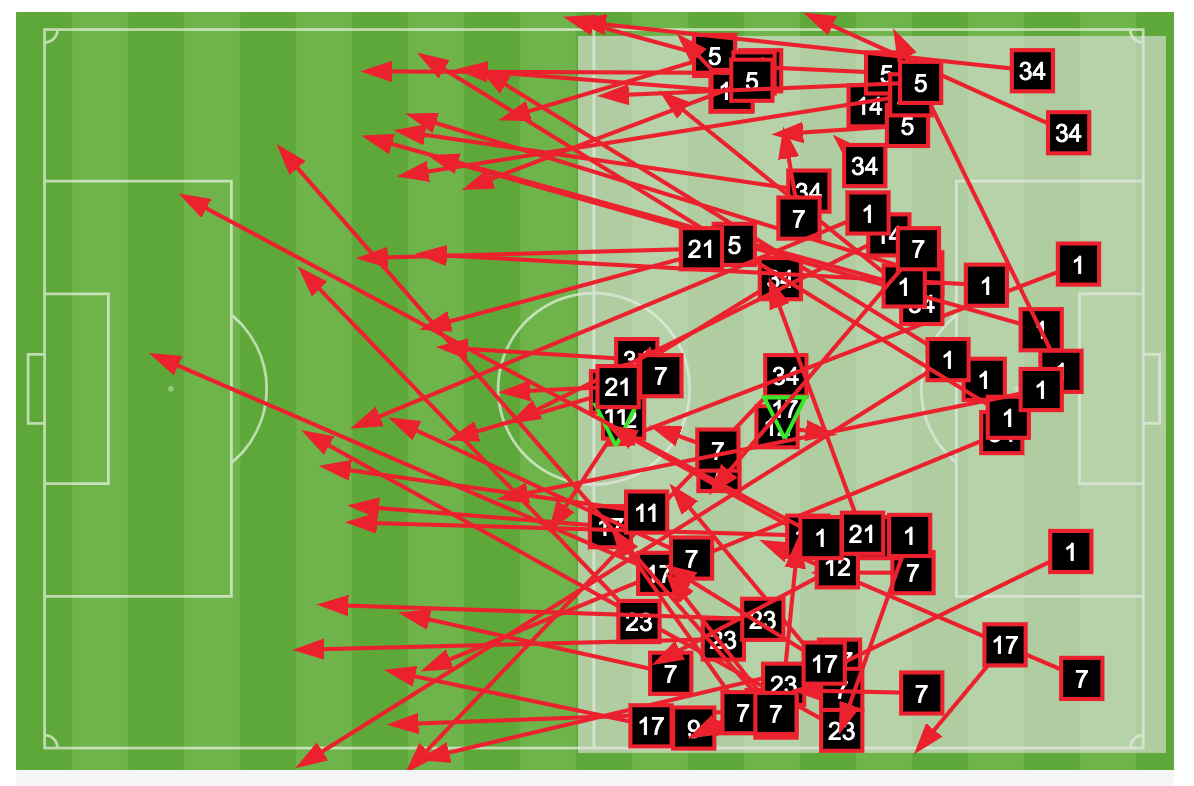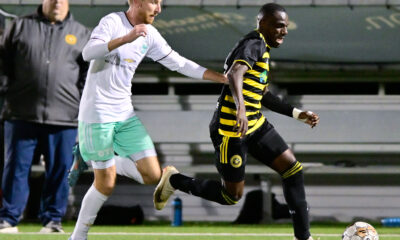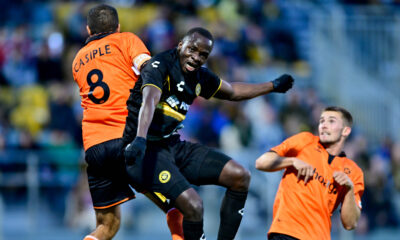
There is no arguing that the Pittsburgh Riverhounds have become a better and more successful soccer team since Bob Lilley became the manager. Before 2018, the Hounds had finished with a winning record just 6 times in 18 seasons. Since then, they’ve had a winning record every year. They have a reputation for excellence, a warm and respected supporters group, and a fearsome home-field advantage that forces opponents to play with caution when visiting Highmark Stadium.
And yet.
And yet, after 21 seasons, they still haven’t won a championship. There is no trophy case at Highmark Stadium, because there are no trophies.
It is worth asking how a team that has been so good in the regular season collapsed in the very first round of the playoffs. There’s no clear answer to this question, but the asking of it should be part of the productive process of building for a better 2021.
The Riverhounds playoff game against Louisville featured a variety of exposed weaknesses. The first was that it was a road game. The geographical regrouping of the USL due to Covid-19 meant that the Riverhounds finished second in all of USL on points with 35, yet were forced to play a first-round road game. Pittsburgh knew that they’d have to be on top of their game to secure home-field, but lost their penultimate match of the season to Hartford, giving away the top spot in Group F, a blunder that looks all the more costly in hindsight.
The game itself showed the Hounds had weaknesses that perhaps hadn’t fully been revealed in the regular season. Pittsburgh’s regular-season opponents often played cautiously, while Louisville pressed the ball aggressively in every quadrant of the field. The relentless pressure led to errors and turnovers. The Riverhounds usually are tidy and flawless when they possess the ball in their own half, and often take the time to work the ball up the wings or through the middle efficiently. In this game, they were pressured, and the pressure worked.

That’s the passing map of all the unsuccessful passes. That’s a lot more mistakes in their own half by Skylar Thomas (#34), Jordan Dover (#5), Ray Lee (#23), and even the usually unflappable Ryan James (#7).
The pressure also meant that the Riverhounds didn’t have the same number of opportunities to produce a well-coordinated attack, nor did they have enough time in the attack to work their way through the defense. Although the possession stats indicate that Pittsburgh had the advantage over Louisville, 52.4%-47.6%, remember that Cameron Lancaster scored the go-ahead goal in just the 17th minute. Normally, a team with a lead buttons up and defends more conservatively, ceding possession to their opponent. Louisville continued to press, and it continued to shake the Hounds.
Questions can also be asked about the Hounds midfielders, Robbie Mertz, Danny Griffin, and Kenardo Forbes. Forbes wasn’t his usual self in this match – after a regular season where he led the team in Key Passes with 26, he produced just one on the night, off a corner kick. Kenny was also dispossessed on the dribble twice at midfield, something I don’t recall seeing once this year. Danny Griffin was asked to play deeper, as the defensive midfielder, and often looked to be rushing back into place to defend a few steps behind the attack. Robbie Mertz spent a lot of time in wide spaces instead of tucked inside in his most dangerous spots. Below you see Mertz, #14, crunched up along the right sideline. He did not produce a key pass on the night and took just one shot, off-target, and not till the 89th minute.

If the plan was to send Robbie one v one versus Louisville left back Oscar Jimenez, it clearly didn’t work.
Overall, it looks like the preparation, the game planning, the adaptability, the mental fortitude to be focused and do the job were all off on the night. And it cost the Hounds, once again. I hate writing it, but it’s true.
One other factor that may have contributed to the Hounds defeat was this year’s regular-season format. The Riverhounds spent much of the summer battering woeful (and youthful) Loudoun, NYRB II, and Philadelphia II. Pittsburgh played 9 of their 16 games – the majority of the season (!) – against those three teams. The three combined for an atrocious 8W-6T-31L record. They were collectively beaten by the Hounds by an aggregate score of 26-4. When you spend the majority of matches playing inferior, mediocre opponents, you run the risk of becoming complacent. Of believing you are better than you actually are. Of potentially playing down to their level. Perhaps the Hounds had become overconfident because they spent much of the year feasting on the league’s worst teams. Perhaps they weren’t really that good to begin with – they only looked good against bad teams, and they played too often against bad teams.
Bob Lilley is a master of roster construction. As Mike Watts said during the broadcast, he just has a knack for finding guys and slotting them into the team. Lilley’s also great at getting the most out of players – he helped transform Forbes from an unknown indoor soccer player in Utica, NY into one of the USL’s most respected midfielders. But Bob’s teams have struggled in the playoffs. In the last three years, the Riverhounds are 1-3 in the postseason. And have been dispatched two-years in a row by Louisville City FC.
A good soccer coach, and a good soccer team wins. A *great* soccer coach; a *great* soccer team not only wins, but adapts and evolves through time. Introspection must occur. Growth and change must be considered. Maybe there need to be new ideas added to the team, or greater depth, or a different approach to game planning. Maybe the team needs a different look, or a variety of looks.
Or maybe nothing’s wrong, and soccer is soccer. Sometimes a good team has an off night. Even the 1996 Chicago Bulls lost 10 games in the regular season. In retrospect, one might look back at the game and ask a big question regarding a critical moment in the match that could have changed everything – the moment Robbie Mertz was brought down in the box in the first half, but referee Elton Garcia made no call. It could have changed everything. Maybe the Riverhounds are on the right path, and just need to see things out to fruition. Maybe they are a few players away from the right mix for a trophy.
The Riverhounds in 2020 were very good, but they were not great, nor did they achieve greatness. The Hounds are closer to greatness than they’ve ever been before. Once again, they will spend the offseason asking the question of how they get there from here.
…
image c/o Louisville City via twitter

















